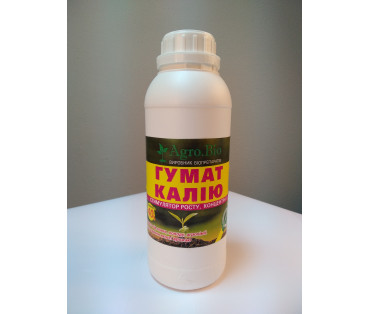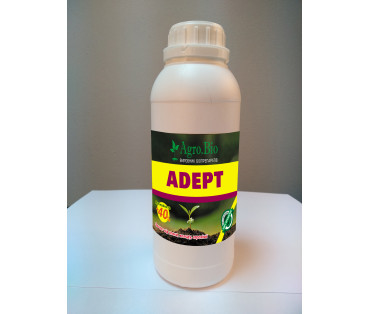Effects of Adept Agro.Bio and potassium humate with microelements on the dynamics of dry matter accumulation in leaf surface and transpiration of tomatoes
Research from previous years has shown that when potassium humate and other humic fertilizers are applied, tomatoes develop their assimilating leaf surface more intensively, better absorb mineral nutrition elements, accumulate more organic substances, and increase yield. This has been confirmed by more recent studies, as shown in Table 1.
| Experiment variations | Leaf surface increase | Transpiration | Yield (% of control) |
|---|---|---|---|
| Control (mineral mixture) | 39.8 | 80.0 | 100.0 |
| Mineral mixture + potassium humate | 47.6 | 85.5 | 121.7 |
| Mineral mixture + Adept Agro.Bio | 55.3 | 93.4 | 137.9 |
Yield increase depends on the plant's dry matter accumulation process. It is known that plant organisms consist of 85-90% carbohydrates. Therefore, it is important to understand the influence of potassium humate and Adept Agro.Bio on carbohydrate metabolism in plants. Research results are presented in Tables 2 and 3.
| Experiment variations | 7 hours | 11 hours | 15 hours | 19 hours |
|---|---|---|---|---|
| Control (mineral mixture) | 5.00 | 5.17 | 5.68 | 6.31 |
| Mineral mixture + potassium humate | 6.42 | 6.34 | 5.52 | 4.80 |
| Development phase | Experiment variations | 7 hours | 11 hours | 15 hours | 19 hours |
|---|---|---|---|---|---|
| Budding (May 25) | Control (mineral mixture) | 6.47 | 8.92 | 7.94 | 6.91 |
| Mineral mixture + potassium humate | 7.77 | 10.97 | 8.34 | 6.07 | |
| Mineral mixture + Adept Agro.Bio | 6.52 | 9.48 | 8.14 | 5.43 | |
| Flowering (June 5) | Control (mineral mixture) | 7.21 | 8.75 | 6.45 | 8.91 |
| Mineral mixture + potassium humate | 7.63 | 9.36 | 7.34 | 7.95 | |
| Mineral mixture + Adept Agro.Bio | 7.60 | 10.02 | 8.36 | 7.27 | |
| Fruit formation (July 6) | Control (mineral mixture) | 5.60 | 8.65 | 7.50 | 7.22 |
| Mineral mixture + potassium humate | 5.57 | 7.46 | 6.30 | 6.94 | |
| Mineral mixture + Adept Agro.Bio | 5.40 | 6.10 | 6.30 | 6.50 |
These data show that in young plants (budding and flowering phases), potassium humate and Adept Agro.Bio promote more intensive sugar accumulation in tomato leaves throughout the day. Only in the evening does the amount of sugar in these plants decrease. In 2019, no decrease in carbohydrates was observed by 3 PM, which was apparently due to cooler weather.
As the organism ages (during fruit formation and growth), under the influence of potassium humate, a decrease in sugars in the leaves was observed. Evidently, during fruit growth, the outflow and transformation of sugars occurs more vigorously, as these plants produce a yield much higher than the control plants during an equal vegetation period.
Potassium humate and Adept Agro.Bio not only promote sugar accumulation but also have a significant impact on the total dry matter content in tomato leaves, especially during the flowering and budding phases (Table 4).
| Development phase | Experiment variations | 7 hours | 11 hours | 15 hours | 19 hours |
|---|---|---|---|---|---|
| Budding (May 25) | Control (mineral mixture) | 14.5 | 15.0 | 16.5 | 17.0 |
| Mineral mixture + potassium humate | 14.0 | 15.5 | 17.0 | 17.5 | |
| Mineral mixture + Adept Agro.Bio | 14.0 | 17.0 | 17.5 | 17.5 | |
| Flowering (June 5) | Control (mineral mixture) | 13.3 | 15.0 | 15.5 | 15.0 |
| Mineral mixture + potassium humate | 14.3 | 15.5 | 16.0 | 16.5 | |
| Mineral mixture + Adept Agro.Bio | 14.0 | 15.5 | 16.0 | 16.0 | |
| Fruit formation (July 6) | Control (mineral mixture) | 15.5 | 16.0 | 14.5 | 15.5 |
| Mineral mixture + potassium humate | 15.7 | 15.5 | 14.3 | 14.5 | |
| Mineral mixture + Adept Agro.Bio | 15.3 | 16.0 | 14.7 | 15.5 |
In the arid climate of southern Ukraine, water is often a limiting factor, and yield depends on the extent to which plants are supplied with moisture. Therefore, it is important to determine how the application of potassium humate and Adept Agro.Bio affects plant transpiration.
For this purpose, vegetation experiments were conducted in 2019-2020. The experiments were set up with tomatoes of different varieties in sand cultures using Pryanishnikov's mineral mixture. The container capacity was 14 kg in 2019 and 4 kg of sand in 2020. The experiment had 8 repetitions. Watering was done by weight up to 70% of full moisture capacity. Adept Agro.Bio was applied before seedling planting, while potassium humate was applied during watering at a concentration of 0.001%. To prevent water evaporation, the containers were tightly covered with percale fabric at the top, tied, and coated with white paint. In 2020, the experiment was terminated during fruit growth.
Tables 1, 5, and 6 show that when potassium humate and Adept Agro.Bio are applied, tomatoes significantly increase their leaf surface area. This leads to additional water consumption per plant.
| Experiment variations | Fruit weight | Leaf weight | Root weight | Yield (% of control) |
|---|---|---|---|---|
| Control (mineral mixture) | 92.0 | 25.7 | 31.7 | 100.0 |
| Mineral mixture + Adept Agro.Bio | 127.5 | 38.5 | 49.5 | 174.6 |
| Experiment variations | Leaf area (cm²) | Transpiration intensity (g/m² per hour) | Water evaporated (g) | Transpiration coefficient | Transpiration productivity |
|---|---|---|---|---|---|
| Control (mineral mixture) | 158 | 73.0 | 3645 | 236.5 | 4.23 |
| Mineral mixture + Adept Agro.Bio | 140 | 57.3 | 3666 | 209.9 | 4.88 |
It creates the impression that fertilized plants use moisture less productively, which could worsen the water regime. However, experiments indicate otherwise. Table 6 shows that plants fertilized with Adept Agro.Bio use water more economically. They have reduced transpiration intensity, a lower transpiration coefficient, and increased transpiration productivity. This means that when plants are fertilized with Adept Agro.Bio, they use less water to create a unit of yield, i.e., with the same moisture reserve in the soil, they can produce a higher yield.
It is noteworthy that potassium humate and Adept Agro.Bio enhance the development of the root system. As shown in Table 5, in the vegetation experiment, when Adept Agro.Bio was applied, the root weight was almost one and a half times greater than in the control plants. This is also evident in Figure 2, which shows the root system of tomatoes from the 2020 experiment.
The experiment shows that in the area where Adept Agro.Bio was applied during seedling planting, the fibrous root system develops additionally and intensively. The enhanced development of the root system definitely increases water delivery to the leaves and contributes to improved water supply to the plants.
Related Products
Humate Potassium + Phosphorus «Agro.Bio»
Potassium humate + ballast-free phosphorus from leonardite produced by AGRO.BIO is an environmentally friendly complex fertilizer and growth stimulator for agricultural plants, of organic origin, with..
$7.00
Adept «Agro.Bio»
Product Adept "Agro.Bio" is an innovative solution in agriculture to support the growth and development of plants. A biostimulant based on ginseng root micromycete fungi provides a wide range of effec..
$13.00


